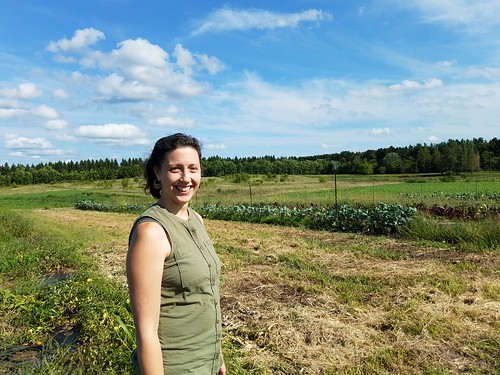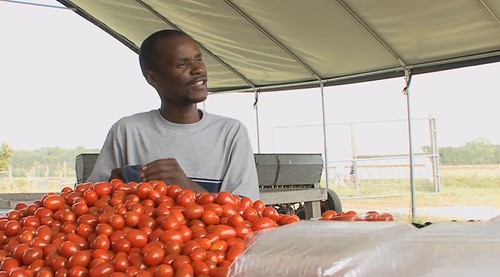
Fresh. Local. Honest. This motto underscores the guiding philosophy of the Minnesota Food Association (MFA). To achieve its goals of promoting healthy food and regenerative agriculture, the MFA offers workshops for farmers and helps immigrants learn how to farm sustainably in local conditions.
The MFA manages Big River Farms, a 150-acre certified-organic teaching farm. Farmers can enroll in a three-year training program, during which they’re taught about local soils and growing conditions, trained in organic certification and farming methods, and provided a large plot of land to manage. Many of the farmers are immigrants and refugees.
“I thought America was all cities and buildings. I didn’t picture the farmland,” said Suraj Budathoki, a Bhutanese refugee from Nepal. He is a recent graduate of Big River Farms.
Budathoki grew up in a refugee camp. He helped his parents farm a small plot of land just outside the camp. When he immigrated to the United States, he was familiar with farming, but not with Minnesota agriculture. Big River Farms helped him make the transition. “I like nature and working in the environment. It’s my passion.”
“Big River Farms works with immigrants, minorities, veterans and members of the LGBT community,” says Hilary Otey Wold, executive director at MFA. “Reaching out to the historically underserved is a big part of what we do.”

USDA’s Natural Resources Conservation Service supports MFA in its outreach efforts. “We are committed to reaching and helping all farmers who are ready to practice conservation,” said NRCS Chief Jason Weller. Funding provided by NRCS’ Conservation Innovation Grant (CIG) program helps MFA reach, educate, and empower future conservation leaders.
While teaching technical skills, MFA also encourages social skills. “Farmers are teaching farmers,” said Wold. “Experienced farmers mentor those who are new.” The benefits of this mentorship extends beyond the program. “Many of our farmers go on to become active leaders in the community. They’re eager to share skills and knowledge with their neighbors.”
While they’re practicing sustainable, organic farming methods, farmers also learn how to market and sell produce through Community Supported Agriculture (CSAs) and farmers markets. They learn the full farm-to-market procedure.
“I grew up on a farm in rural western Kenya,” said Moses Momanyi, another graduate of Big River Farms. “Everything we ate we grew. The farming lifestyle is in me, it’s in my family.” Momanyi and his family now have their own operation, Dawn 2 Dusk Farm.
His experience with the MFA paved the way for his current success. “MFA has been very an excellent resource,” he said. “They have helped me to know that I can do this. If I hadn’t come to MFA, I couldn’t have figured out how to do wholesale, or the CSA, or farmers markets. It would have been very difficult.”
In addition to helping historically underserved farmers, the MFA offers many public workshops and field days throughout the year. “We want to provide the farming community with the knowledge and training it needs,” said Wold. “Our workshops are very hands-on. We talk about the best farming methods for local conditions.”
The successful, ongoing work by the MFA proves that conservation farmers aren’t born, they’re grown.
Since 2009, USDA has invested more than $29 billion to help producers make conservation improvements, working with as many as 500,000 farmers and ranchers each year to implement conservation practices on a total of 400 million acres of farm, ranch and forestland. Since 2009, over 400 Conservation Innovation Grants have been awarded to support innovative conservation approaches and technologies that develop new ways to attract private investment in natural resource conservation and help farmers and ranchers make their operations more resilient to climate change. For the latest selection of Conservation Innovation Grants, view the 2016 award announcement or to find out more about current and past projects, visit Conservation Innovation Grants on the web. To read more about USDA's investments in rural America and its successful turnaround, visit USDA's latest entry on Medium.com, Rural America Is Back in Business.




